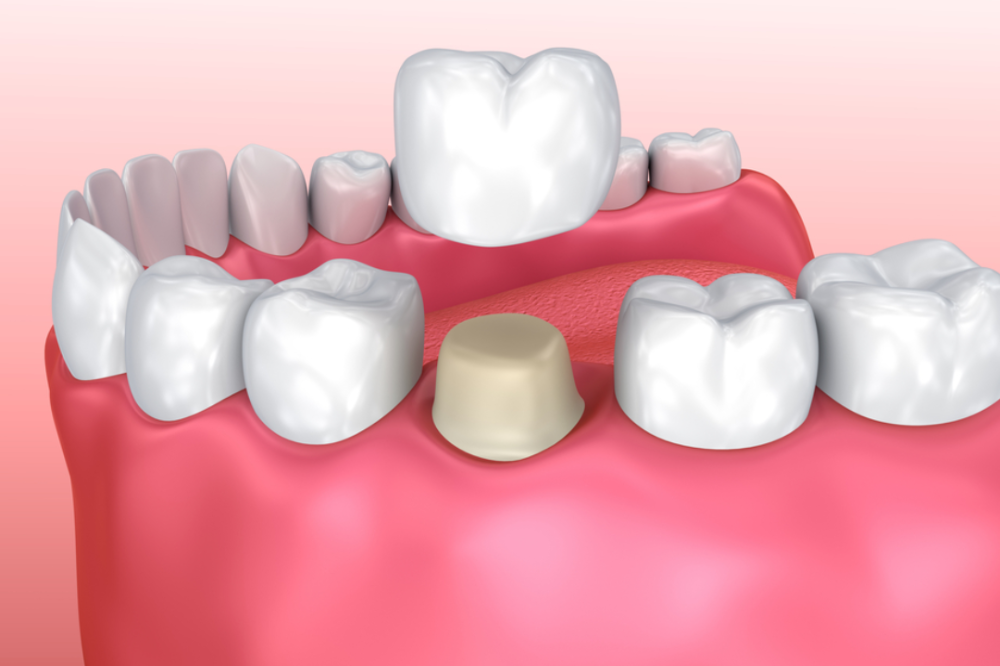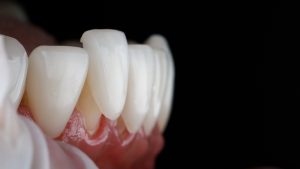Dental crown glue is used by dentists to hold the crown on your teeth. Crowns must be fixed to an implant connected to your jaw bone and attached to abutments. In order to keep this all in place, the dentist near you will use a type of dental glue also known as dental crown cement. The dental cement for crowns works to create the right hold, resistance, and bond for your crown.
Temporary vs Permanent Dental Glue
Depending on your personal needs, your dentist may use temporary or permanent dental glue.
Temporary Dental Glue
Creating permanent crowns can take time. Usually, dentists create a temporary crown with semi-permanent dental cement. This type of easy-to-break dental glue is used to address numerous dental problems. The most common type of temporary dental glue is Zinc oxide-eugenol dental cement.
Permanent Dental Glue for Crowns
Dental glues intended to create a permanent seal include zinc phosphate, glass ionomer (GI), resin-modified glass ionomer (RMGI) and resin cement. Some dentists find that dental glue for crowns most commonly includes GI and RMGI cement. Resin cement contains compounds that may affect the strength of the cement and consistency of the hold.
Your dentist will decide on the right type of dental crown glue for you. For example, GI cement will not be used on metal crowns or porcelain. Whichever dental cement your dentist chooses, make sure you know which type of crown you need ahead of time.
How Dentists Choose Dental Cement
Typically, dentists decide on the type of dental cement they will use based on these factors:
Longevity
Your dentist will choose a type of cement for the crown based on its longevity. If you only need a temporary dental glue, they will decide accordingly. Permanent dental crown cement is used when your dentist knows your crown is intended for a permanent hold.
Durability
Permanent dental glue is required for long-term bridges and crowns. People who need dental cement that delivers strength without a hard finish, usually use eugenol-free cement. However, other types such as polycarboxylate are also available. Both of these types of permanent cement are known for high retention as well as minimizing post-operatory sensitivity.
Esthetics
Depending on your needs, resin-based dental crowns may be the right choice. Talk to your dentist about the type of temporary cement made with resin that has a clear color base. Esthetically, these types of cement are a popular choice because they are easy to clean and offer a solid hold. However, they are difficult to remove and they may also be prone to discoloration.
Types of Dental Crowns
There are four major types of dental crowns:
Ceramic
Used for dental restoration, these types of dental crowns are popular for their ability to blend in with the natural color of your teeth. Since it is a natural looking porcelain-based material, a ceramic crown might be indistinguishable from your real teeth.
Porcelain-fused-to-metal
Designed to deliver a stronger bond than porcelain, these types of crowns are also very popular. And since they are fused together with a metal structure, they are highly durable as well.
Gold alloys
A combination of metals including gold, copper, and others make this type of crown very durable. The bond is tight and known for not wearing away or breaking easily.
Base metal alloys
Non-noble metals are resistant to corrosion, and thus, are used for some of the strongest types of crowns. There are also bridges used to cover spaces left by broken or missing teeth. Although they are able to cover the space between your teeth, they require dental glue for attaching the natural teeth to your implants.
Talk to Your Dentist About Crowns
Healthy teeth and gums are important at any age. If you already have bridges and crowns, always maintain a regular dental care routine to keep them from becoming loose or falling out. Using a toothpaste designed for creating strong teeth and healthy gums is the best way to keep your smile bright.
If you are ready to discuss damaged teeth, bridges, and crowns, contact the office of Gables Sedation Dentistry. Their prosthetic devices can strengthen your damaged teeth and improve the overall appearance of your smile, bite, alignment, and shape.
Book your appointment today!










